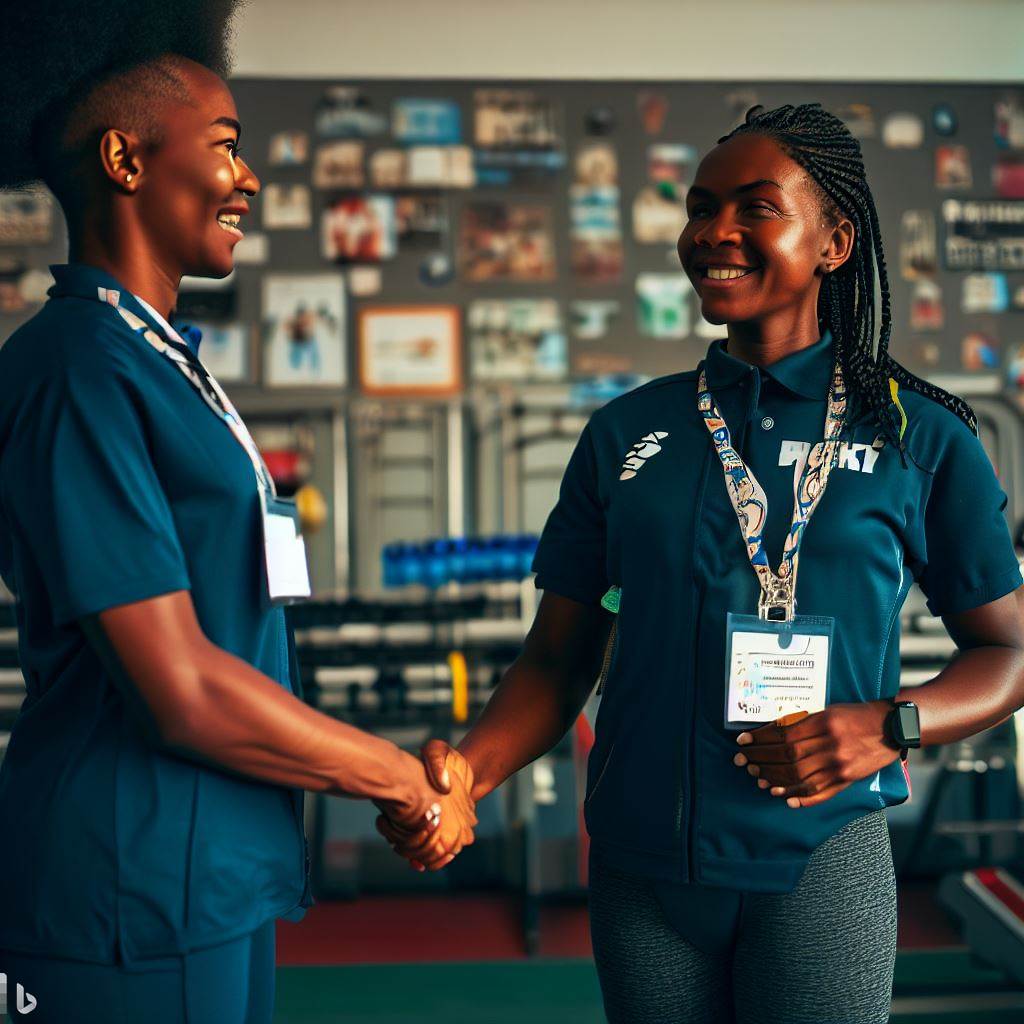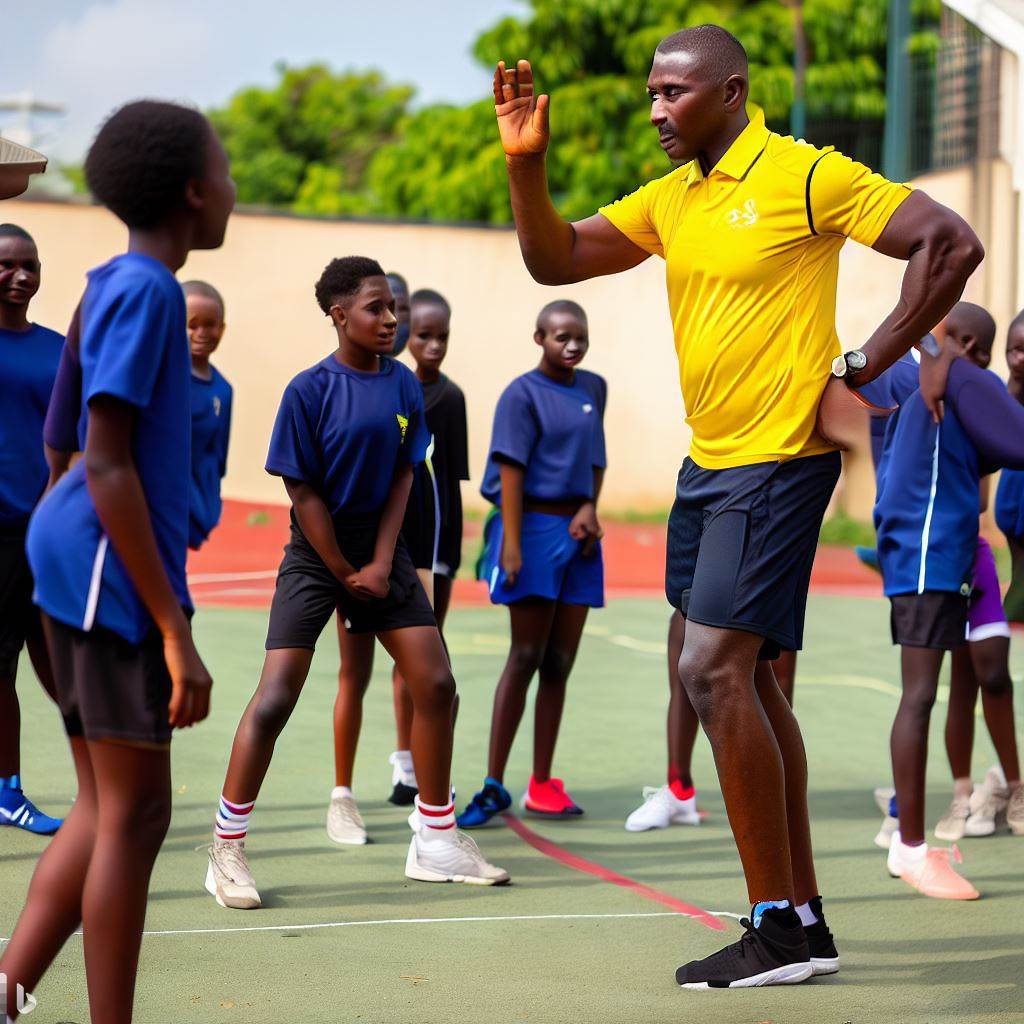Introduction
Networking is a crucial aspect for athletic trainers in Nigeria, enabling them to connect with fellow professionals, organizations, and gain valuable opportunities.
It plays a significant role in career growth and professional development.
A. The Importance of Networking for Athletic Trainers in Nigeria
Networking allows athletic trainers in Nigeria to expand their professional connections and build relationships within the industry.
It provides a platform to exchange knowledge, ideas, and experiences, fostering continuous learning and growth in their field.
B. Benefits of Networking for Career Growth and Professional Development
Networking offers numerous benefits for athletic trainers in Nigeria.
Firstly, it allows them to stay updated on the latest trends, research, and developments in their field.
By interacting with other professionals, they can gain new insights and expand their knowledge base.
Furthermore, networking provides opportunities for collaboration and partnerships, enabling athletic trainers in Nigeria to work on projects and initiatives that enhance their career prospects.
It opens doors to potential job opportunities, internships, and mentorship programs, facilitating career advancement.
Moreover, networking facilitates the exchange of resources, such as information about training programs, conferences, and workshops that can contribute to professional development.
By attending these events, trainers can enhance their skills and knowledge, staying at the forefront of their profession.
Networking also creates a support system for athletic trainers, offering a platform to seek advice, share challenges, and find solutions.
It fosters a sense of belonging within the community and helps overcome professional obstacles.
In essence, networking is vital for athletic trainers in Nigeria as it enables them to forge meaningful connections, enhance their career growth, and continuously develop professionally.
By actively participating in networking activities, trainers can seize various opportunities that contribute to their success in the field.
Overview of Athletic Training in Nigeria
Athletic training is an essential aspect of the sports industry in Nigeria, providing professional care and support to athletes.
Athletic trainers play a crucial role in preventing, diagnosing, and treating sports-related injuries.
These professionals are responsible for managing the overall health and well-being of athletes, ensuring their physical readiness, and promoting their optimal performance.
They are typically found in sports teams, gyms, rehabilitation centers, and academic institutions.
A. General overview of the athletic training profession in Nigeria
The profession of athletic training in Nigeria is still developing but is gaining recognition and importance in the sports industry.
Athletic trainers in Nigeria go through rigorous training programs to acquire the necessary skills and knowledge.
These professionals are equipped with expertise in injury prevention, emergency care, therapeutic intervention, and rehabilitation techniques.
They work closely with coaches, doctors, and other medical professionals to ensure the overall health and safety of athletes.
B. Relevant statistics and information about the industry
- According to a survey conducted by the National Association of Athletic Trainers in Nigeria, there are approximately 500 registered athletic trainers in the country.
- Nigeria has seen a significant increase in the number of sports events and competitions, leading to a higher demand for athletic trainers.
- The sports industry in Nigeria contributes significantly to the country’s economy and has a positive impact on the overall well-being of athletes and the general population.
- Major sports in Nigeria include football, basketball, athletics, boxing, and wrestling, among others, which require the expertise of athletic trainers.
- Athletic trainers in Nigeria face various challenges, including limited resources, inadequate facilities, and the need for continuous professional development.
Athletic trainers in Nigeria can enhance their professional networks and improve their expertise through effective networking.
Here are some tips and groups that can help:
Tips for networking as an athletic trainer in Nigeria
- Attend sports conferences, workshops, and seminars to meet fellow athletic trainers and industry experts.
- Join professional associations and organizations such as the National Association of Athletic Trainers in Nigeria.
- Participate in online forums and communities dedicated to sports medicine and athletic training.
- Volunteer for sports events and collaborate with other professionals to expand your network.
- Build relationships with coaches, doctors, and physiotherapists who can refer athletes to you.
Relevant networking groups for athletic trainers in Nigeria
- Nigerian Sports Medicine Association (NSMA)
- Athletic Trainers Association of Nigeria (ATAN)
- Nigeria Sports Science and Medicine Association (NSSMA)
- Nigerian Athletic Training and Sports Medicine Society (NATSMS)
By actively engaging in networking activities and joining relevant professional groups, athletic trainers in Nigeria can expand their career opportunities, share knowledge, and promote the development of the athletic training profession in the country.
Read: Women in Athletic Training in Nigeria: Opportunities and Challenges
Significance of Networking for Athletic Trainers
Networking plays a crucial role in the career growth and professional development of athletic trainers in Nigeria.
By connecting with other professionals in the field, athletic trainers can open doors to numerous job opportunities and enhance their knowledge and skills.
A. How Networking can Lead to Job Opportunities and Career Growth
Networking provides athletic trainers with a platform to showcase their expertise and skills, leading to potential job opportunities.
By attending industry conferences, seminars, and workshops, athletic trainers can meet potential employers and establish valuable connections that can lead to job offers.
Through networking, trainers can access the hidden job market, where many positions are filled through professional referrals.
Furthermore, being part of professional networks allows trainers to stay updated with job openings and career advancement opportunities.
B. Gaining Knowledge and Staying Updated
Networking is not limited to job opportunities; it also plays a significant role in acquiring knowledge and staying updated with industry trends.
Through networking, athletic trainers can exchange ideas, experiences, and best practices with their peers.
Attending conferences and professional events offers trainers the opportunity to learn from industry experts, gain insights, and stay up-to-date with the latest advancements in sports medicine and training techniques.
Moreover, participating in online forums and joining professional social media groups can provide trainers with access to a wealth of knowledge and resources.
C. Building Connections with Professionals
Building connections with other professionals in the field is essential for athletic trainers in Nigeria.
Networking allows trainers to forge relationships with seasoned professionals who can offer guidance, mentorship, and support throughout their career journey.
By connecting with other athletic trainers, trainers can share challenges, seek advice, and gain new perspectives on common issues in the field.
Building a strong professional network can also lead to collaborative opportunities, joint research projects, and partnerships with other organizations.
Networking is paramount for athletic trainers in Nigeria, offering various benefits such as job opportunities, career growth, knowledge acquisition, and building connections with industry professionals.
By actively participating in networking events, conferences, and online communities, athletic trainers can enhance their professional standing and open doors to new possibilities in their field.
Read: Continuing Education for Athletic Trainers in Nigeria
Tips for Effective Networking
Networking plays a crucial role in the success of athletic trainers in Nigeria.
By building a strong network, trainers can share experiences, gain support, and explore new opportunities.
Here are some tips to enhance networking skills:
A. Set Clear Networking Goals
Before diving into networking, it is essential to establish clear goals.
Determine what you hope to achieve through networking – whether it’s finding job opportunities, collaborating with fellow trainers, or expanding your knowledge and skills.
These goals will guide your networking efforts and help you focus on specific outcomes.
B. Attend Conferences, Workshops, and Seminars
Participating in industry-related events is an excellent way to meet and connect with other athletic trainers in Nigeria.
Conferences, workshops, and seminars provide opportunities to learn from experts, discover new trends, and engage in meaningful discussions.
Be proactive and make an effort to interact with other professionals during these events.
C. Engage in Meaningful Conversations and Make Connections
Engaging in meaningful conversations is a crucial aspect of networking.
When attending events or social gatherings, approach fellow trainers, share your experiences, and show interest in their work.
Remember to listen actively and ask thoughtful questions. Building solid connections through genuine conversations can lead to future collaborations and professional growth.
D. Utilize Social Media Platforms
Social media platforms play a significant role in connecting professionals from various backgrounds.
Utilize platforms like LinkedIn, Twitter, and Instagram to establish an online presence and connect with other athletic trainers.
Join relevant groups and discussions, participate in online forums, and share valuable content to establish yourself as a knowledgeable and active member of the athletic training community.
E. Follow Up and Maintain Relationships
Networking is not just about initial meetings; it requires nurturing relationships over time.
After connecting with fellow trainers or professionals, make an effort to follow up with them.
Send personalized emails or messages, express your interest in collaborating further, and stay connected through periodic check-ins.
By maintaining these relationships, you demonstrate your commitment to building a strong network.
Networking is a powerful tool for athletic trainers in Nigeria to expand their professional horizons.
By setting clear goals, attending industry events, engaging in meaningful conversations, utilizing social media platforms, and maintaining relationships, trainers can establish a robust and supportive network.
Embrace networking as an ongoing process, and watch as it opens doors to new opportunities and enhances your career as an athletic trainer.
Read: The Future of Athletic Training in Nigeria: Expert Insights

Networking Groups for Athletic Trainers in Nigeria
Networking is an invaluable tool for athletic trainers in Nigeria to connect with others in the field, share experiences, and gain knowledge.
By joining networking groups, athletic trainers can benefit from a range of opportunities that can enhance their professional growth.
In this section, we will explore some of the existing networking groups in Nigeria, discuss the advantages of joining these groups, and highlight the activities and opportunities they offer.
A. Networking Groups for Athletic Trainers in Nigeria
- Association of Sports Medicine and Sports Science of Nigeria (ASMMSSN): ASMMSSN is a prominent networking group for athletic trainers in Nigeria.
- Nigerian Athletic Trainers Association (NATA): NATA aims to provide a platform for networking and professional development for athletic trainers.
- International Federation of Sports Physical Therapy (IFSPT) Nigeria Group: This group focuses on networking and promoting sports physical therapy in Nigeria.
B. Benefits and Advantages of Joining Networking Groups
- Access to a supportive community of athletic trainers with similar goals and interests.
- Opportunity to exchange ideas, knowledge, and best practices with experienced professionals.
- Possibility of collaborating on research projects and publications, enhancing professional credentials.
- Increased visibility within the sports medicine community, leading to potential career opportunities.
- Exposure to workshops, seminars, and conferences organized by the networking groups.
C. Activities and Opportunities Offered by Networking Groups
- Regular meetings and forums where members can engage in discussions, share their experiences, and seek advice.
- Webinars and online platforms for virtual collaboration, allowing members to connect regardless of geographical barriers.
- Networking events, such as conferences and symposiums, to foster face-to-face interactions and build professional relationships.
- Mentorship programs that pair experienced athletic trainers with early-career professionals for guidance and support.
- Opportunities for continuing education through workshops and seminars conducted by renowned experts in the field.
In essence, networking groups play a crucial role in connecting athletic trainers in Nigeria and providing them with numerous benefits.
By joining these groups, athletic trainers can tap into a supportive community, gain knowledge, and access various opportunities for professional growth.
The existing groups mentioned earlier, such as ASMMSSN, NATA, and IFSPT Nigeria Group, are excellent examples of networking platforms available for Nigerian athletic trainers.
Engaging in these groups can contribute significantly to the overall development and success of athletic trainers in Nigeria.
Read: Nigeria’s Assistant Coach Success Stories in 2022
Promoting Networking Within the Athletic Training Community
Networking plays a crucial role in the professional development of athletic trainers. It provides opportunities for knowledge sharing, collaboration, and career advancement.
In Nigeria, where the athletic training community is growing rapidly, promoting networking is paramount.
Here are some valuable tips to encourage networking among fellow athletic trainers:
- Attend conferences and workshops: These events bring together athletic trainers from various backgrounds, providing an excellent platform for networking.
- Utilize social media platforms: Join online communities and professional groups related to athletic training to connect with like-minded individuals.
- Engage in mentorship programs: Mentorship programs foster networking by connecting experienced athletic trainers with those who are just starting their careers.
- Participate in volunteer activities: Volunteering not only contributes to the community but also allows you to meet and interact with other athletic trainers.
- Arrange informal meetups: Organize casual gatherings where athletic trainers can come together to discuss challenges, experiences, and opportunities.
A. The benefits of creating local networking events or meetups
Local networking events or meetups can have significant positive impacts on the athletic training community in Nigeria.
Here are several benefits that arise from organizing such events:
- Establishing a sense of community: Local events bring together athletic trainers in a specific region, fostering a sense of camaraderie and support.
- Sharing knowledge and experiences: These events provide a platform for individuals to share best practices, techniques, and success stories.
- Building professional relationships: Networking events allow athletic trainers to form meaningful connections, leading to potential collaborations and career opportunities.
- Promoting continuous learning: Through presentations and discussions, local events contribute to the professional development of attendees.
- Showcasing new trends and innovations: Networking events are an opportunity to learn about the latest advancements in the field of athletic training.
B. Encouraging the involvement of professional associations and organizations
Professional associations and organizations play a vital role in promoting networking activities within the athletic training community.
By actively participating in these initiatives, associations and organizations can enhance the networking culture in Nigeria.
Here’s how they can contribute:
- Organize networking workshops and seminars: These events facilitate connections between athletic trainers and expose attendees to new industry trends.
- Create online forums: Establishing dedicated online platforms allows athletic trainers to engage in discussions and seek advice from experts.
- Provide mentorship programs: Associations and organizations can develop mentorship programs that facilitate networking and knowledge sharing.
- Recognize networking achievements: Acknowledging outstanding athletic trainers who actively engage in networking motivates others to follow suit.
- Facilitate partnerships: Associations and organizations can connect athletic trainers with potential sponsors or collaborators, fostering professional growth.
In general, promoting networking within the athletic training community in Nigeria is essential for professional growth and development.
By implementing the suggested tips, organizing local events, and involving professional associations and organizations, athletic trainers can form valuable connections, share knowledge, and advance their careers.
Gain More Insights: Breaking Down Nigeria’s Athletics Training Systems
Conclusion
Networking is crucial for athletic trainers in Nigeria to foster professional growth and success.
Publish Your Professional Profile, Business or Brand
Showcase your expertise, gain trust, and boost visibility instantly on Professions.ng.
Publish NowBy actively connecting with others in the field, trainers can gain access to valuable resources and opportunities.
To recap, networking provides a platform for trainers to share knowledge, collaborate, and stay up-to-date with industry trends.
It enables them to expand their professional network and establish meaningful relationships with colleagues.
To enhance their professional development, I encourage readers to take proactive steps towards effective networking.
This could involve joining networking groups specifically for athletic trainers in Nigeria or attending industry events and conferences.
By doing so, trainers can create avenues for mentorship, seek advice and guidance, and exchange ideas with fellow professionals.
These networks can also provide access to job opportunities, continuing education, and skill development programs.
So, let us all take the initiative to actively engage in networking activities and make the most of the resources available to us.
Together, we can elevate the field of athletic training in Nigeria and contribute to its growth.
Remember, your network is your net worth. Start connecting, collaborating, and propelling your professional journey forward.




